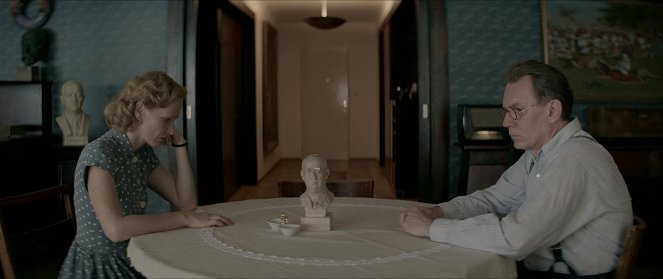Reżyseria:
Jan HřebejkScenariusz:
Petr JarchovskýZdjęcia:
Bartek CierlicaMuzyka:
Petr OstrouchovObsada:
Jiří Macháček, Gabriela Míčová, Aňa Geislerová, Martin Finger, Klára Melíšková, David Novotný, Lenka Krobotová, Karel Dobrý, Sabina Remundová (więcej)Opisy(1)
Komediodramat Dezerter to druga część trylogii Ogród rodzinny. Czechosłowacja, Praga, rok 1947. Ocalony z obozu Otto wraca do żony i syna. Otwiera na nowo swój rodzinny interes, salon fryzjerski "Valentino". Sielanka nie trwa jednak długo. Władza ludowa ingeruje coraz bardziej w życie społeczne. Szeregowy pracownik salonu, młody komunista postanawia odebrać Ottonowi jego salon. Następuje zamiana miejsc, zgodna z obowiązującą walką klas. Otto, jego żona i jej siostry stają się pracownikami. Karlik, 8-letni syn Ottona, postanawia wymierzyć sprawiedliwość. (Żółty Szalik)
(więcej)Recenzje (4)
I’m fairly cautious in approaching Garden Store: Deserter. Again, its qualities are strong, but such an intimate and raw drama is not really a walk in the garden of Eden and it is difficult to relive the grotesque and raw situations over and over again. All the details and the overall feel of the dramatic arcs and human destinies are spicy. For example, by simply casting Zuzana Mauréry in a supporting role in a partial anecdote in a hairdresser's salon, Hřebejk sets the tone for the whole scene, but he is not afraid to keep the comedic episode bittersweet, which is very valuable. It would have been very false to make a pure comedy from those breakthrough years. Thank you and I look forward to the conclusion of the trilogy.
()
I enjoyed the first part of the trilogy, but I had some reservations. This time, I have none. In terms of acting, direction, and writing, Deserter is simply a great movie. I have never seen Jiří Macháček act this well before, Martin Finger confirmed that he’s one of the best contemporary actors, and Gabriela Míčová also got a great opportunity, which she did not waste. The other characters – and there are a lot – aren't just numbers this time, or at least they don't seem to be, and in the end everything fits together and you look forward to the next film. That's how it should be.
()
Hřebejk and Jarchovsky's idea of how to make a "major motion picture" where characters are ruthlessly transformed against the backdrop of brutal history. It's just a shame that you giggle like a madman the whole time, because this artsy drunkenness is fantastically accelerated by the totally obscene (mis)direction and the inept script. Hřebejk clearly has no say at all in how the performers are supposed to conceptualise their characters, so they go to all sorts of lengths to build strong personalities. Machacek's "dramatic transformation", which forces him to alternate between several acting jobs, where he easily outstrips everyone by a wide margin, is perhaps somewhat reminiscent of Bruno Dumont. Jarchovsky hasn't had a clue how people talk to each other for a good ten years now; in my opinion, he doesn't read anything he didn’t write himself, but that doesn't stop him from writing epic historical pieces about how the sleazy Štěpán Kozub, who throws rocks at girls and doesn't want to work (because he's a communist!!), is stealing stuff from a nice, quirky gentleman with a moustache and a coffee machine. It's insane, really, it's almost impossible to watch, but for some reason this creative team manages to keep a close watch over the design and the camera the entire time, so I can't bury it too deep. Besides... well, thanks to the above, I actually had fun with it.
()
"I'm starting to feel that Jan Hřebejk understands the period of communism or its aftermath a little better than the period of Nazism. The characters are portrayed slightly better here, there is a bit better humor than in the first part of the trilogy, but it still falls short of something better than the average rating. This doesn't become a classic."
()

